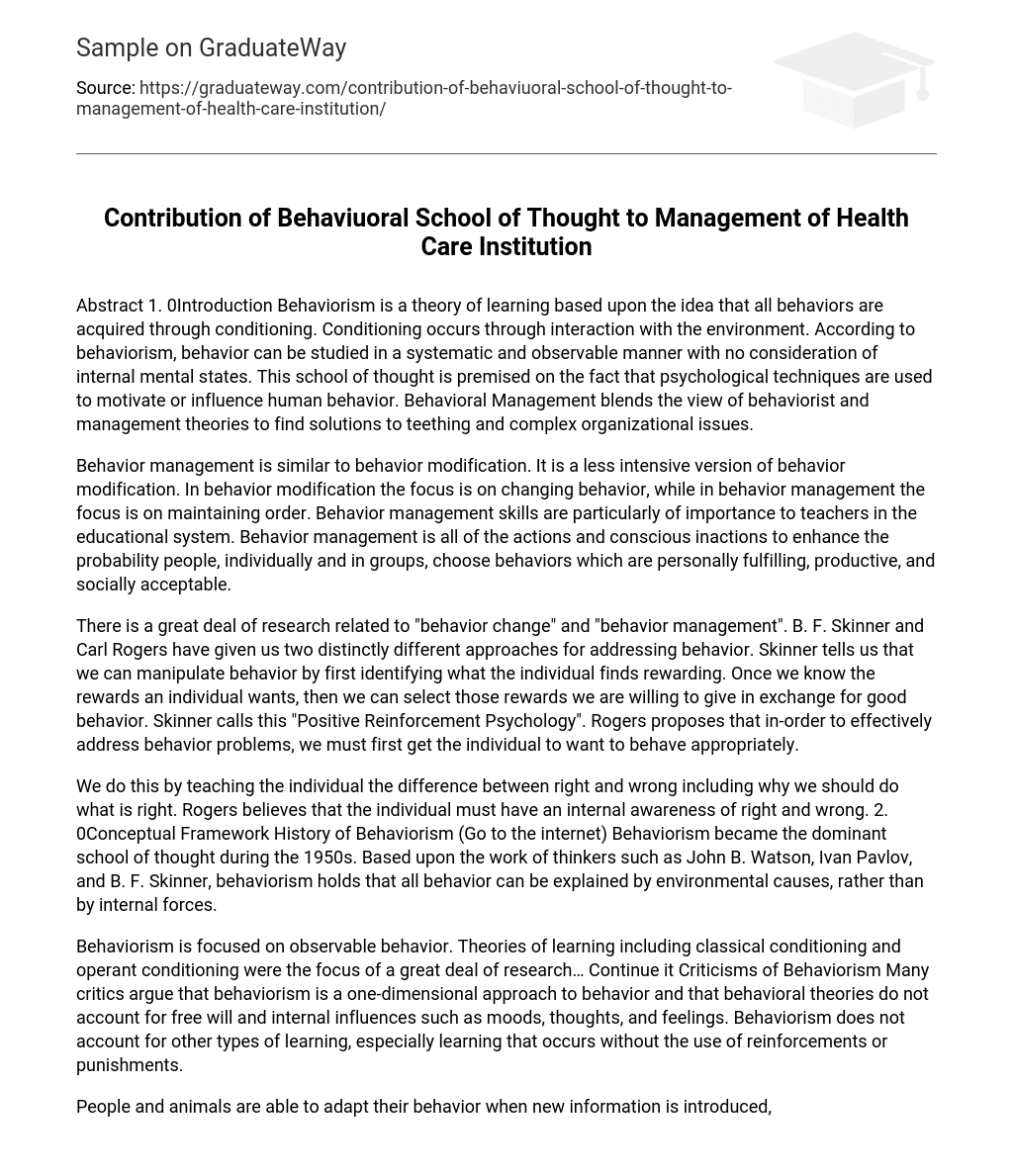Abstract 1. 0Introduction Behaviorism is a theory of learning based upon the idea that all behaviors are acquired through conditioning. Conditioning occurs through interaction with the environment. According to behaviorism, behavior can be studied in a systematic and observable manner with no consideration of internal mental states. This school of thought is premised on the fact that psychological techniques are used to motivate or influence human behavior. Behavioral Management blends the view of behaviorist and management theories to find solutions to teething and complex organizational issues.
Behavior management is similar to behavior modification. It is a less intensive version of behavior modification. In behavior modification the focus is on changing behavior, while in behavior management the focus is on maintaining order. Behavior management skills are particularly of importance to teachers in the educational system. Behavior management is all of the actions and conscious inactions to enhance the probability people, individually and in groups, choose behaviors which are personally fulfilling, productive, and socially acceptable.
There is a great deal of research related to “behavior change” and “behavior management”. B. F. Skinner and Carl Rogers have given us two distinctly different approaches for addressing behavior. Skinner tells us that we can manipulate behavior by first identifying what the individual finds rewarding. Once we know the rewards an individual wants, then we can select those rewards we are willing to give in exchange for good behavior. Skinner calls this “Positive Reinforcement Psychology”. Rogers proposes that in-order to effectively address behavior problems, we must first get the individual to want to behave appropriately.
We do this by teaching the individual the difference between right and wrong including why we should do what is right. Rogers believes that the individual must have an internal awareness of right and wrong. 2. 0Conceptual Framework History of Behaviorism (Go to the internet) Behaviorism became the dominant school of thought during the 1950s. Based upon the work of thinkers such as John B. Watson, Ivan Pavlov, and B. F. Skinner, behaviorism holds that all behavior can be explained by environmental causes, rather than by internal forces.
Behaviorism is focused on observable behavior. Theories of learning including classical conditioning and operant conditioning were the focus of a great deal of research… Continue it Criticisms of Behaviorism Many critics argue that behaviorism is a one-dimensional approach to behavior and that behavioral theories do not account for free will and internal influences such as moods, thoughts, and feelings. Behaviorism does not account for other types of learning, especially learning that occurs without the use of reinforcements or punishments.
People and animals are able to adapt their behavior when new information is introduced, even if a previous behavior pattern has been established through reinforcement. Strengths of Behaviorism Behaviorism is based upon observable behaviors, so it is easier to quantify and collect data and information when conducting research. Effective therapeutic techniques such as intensive behavioral intervention, token economies, and discrete trial training are all rooted in behaviorism. These approaches are often very useful in changing maladaptive or harmful behaviors in both children and adults. . 0Managerial theories ( refer to your write up) 4. 0Contemporary examples Use the Doctor – Nurse agitations on pay rise and extra duty allowances 5. 0Conclusion and Recommendation In spite of the criticism against the concept of behavioral Management is it still relevant to managers in the management of health care institution in Ghana and other related sectors because it deals with the mind and the behavior of people and how psychological techniques are used to motivate and influence human behavior positively.





